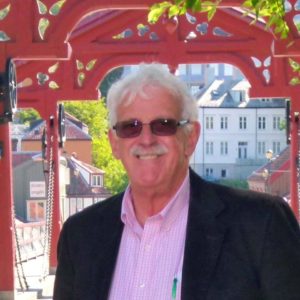
by Dr. William H. Graves, Ed.D
February is National Senior Independence Month. As we think about how to live an independent lifestyle as we age, we must remember that independence is also about making honest and deliberate choices about where we wish to be and how we will stay engaged in our communities. In this month’s blog, NAB Member Bill Graves talks about some of the deliberate choices he is making to maintain ties to family and live in the community on his terms.
“O.K., which of these two places should Gar and Gramps live when we move here to be near you all,” I asked to no one in particular as we drove away from our family tour of two retirement homes in a large midwestern city. Our five-year old grandson shouted out, “The first one, the first one,” as he repeated himself so quickly none of the other three passengers had a chance to respond. “Well, O.K. Why the first one?” “I like it best because it is friendlier, and you will have friends there just like I have in my neighborhood.”
You know the expression, “Old age isn’t for sissies.” My grandson has a better description of the aging process, “Getting old is a time to make new friends and to be happy.” If my five-year old grandson is right, and I believe he is, then how do we, the so-called old, elderly, aged, or whatever label you choose to use to describe yourself, pursue happiness? And, why this pursuit?
The Pursuit of Happiness, a notion elevated as an equal to Life and Liberty, has been ingrained in the American psyche since 1776 when the Declaration of Independence was signed. Happiness isn’t guaranteed, but the right to pursue happiness is. So, how do people who are older like me, 76 since September 2018, pursue it?
The key to happiness
We begin by making choices. The key to happiness is the choices we make as we age. These choices can allow us to live with our infirmities or succumb to the restrictions imposed by infirmities associated with the aging process. Our choices can result in more isolation, loss, and illness. They can also result in decisions which direct how we pursue happiness and opportunities to enhance our quality of life. For example, will I make a choice to thank a fellow aging person when he allows me to help him? You see, I need to help probably more than my help is needed. It is a choice albeit a small one, but it offers an opportunity to share, to help, to interact and to act out my values, all the basis for happiness as I have chosen to define happiness.
Our grandson recommended that we choose the retirement home where he saw the residents and staff as friendly. The basis for his recommendation is echoed in many

You can go to a museum and think, ‘I use a wheelchair to tour a museum with a group of half deaf people. Or you can think, Mattise!’” Image: Two Dancers by Matisse (1967)
studies of older adults. John Leland’s Happiness Is a Choice You Make: Lessons from a Year Among the Oldest Old (2018) is one such example and like my grandson expresses, “Why seeking a friendly environment is so important?”
A friendly environment
First, a friendly environment increases the chances that you will establish new relationships as you age. New relationships bring opportunities to learn and grow. Friendly environments enhance the likelihood you will experience patience, respect, and compassion as you also experience the inevitable decline and loss of faculties, friends, and family. As Leland points out, the choices we make are central to happiness. “You can go to a museum and think, ‘I use a wheelchair to tour a museum with a group of people who are half deaf. Or you can think, Mattise!’” The consequence of choosing Matisse can make all the difference.
We are deliberately choosing to move into a community some 1350 miles from our home on Virginia’s lovely Chesapeake Bay. Wait a minute, I say, “You don’t like cold or snow, and you know no one there. Isn’t that a dicey choice for a person who is old as you are?” Why then are you making this choice?
The simple answer to my question is to pursue happiness by gaining a deeper relationship with our daughter and her family. We choose to be near our grandchildren so we can share in their joys and their tough times. Our aim is to have more time with the grandchildren so we can create an environment that increases the chances that our grandchildren will remember being with Gar and Gramps as a time of fun and being loved unconditionally. Yep, we aim to create happy memories for these five- and eight-year olds, and that is one of the ways we intend to pursue happiness.
Do those things that make you happy or you grow older very quickly
Leland reports his “older old” said clearly that you must do those things that make you happy or you grow older very quickly. We are not interested in growing older faster. So, we have chosen to live closer to our grandchildren and to live in a place that requires less housekeeping, gardening, and meal preparation time for so we will have more time to be with our daughter’s family, to make new friends, and to explore a new city and its culture.
The choices we are making so we can pursue happiness have not been easily made. We are leaving behind friends, a region replete with cultural and social activities, a church and a congregation which shares our love of diversity and service to humankind, and a seacoast area of a physical beauty that is scarcely rivalled on the U. S. East Coast. Yet, we are committed to these choices because of our need to be in close proximity to our family, to learn new ways to make ourselves happy, to be kind and to be grateful for opportunities to be kind; and to gain a better understanding of the wisdom associated with research findings that the pursuit of happiness yields happiness and a quality of life which may be enjoyed physically, mentally, and spiritually.
Oh, so what was the choice of the other passengers in our car on that cold December day for Gar and Gramps’ place of residence? Where should Gar and Gramps live? You might have guessed that their recommendation was the same as our grandson’s. The friendlier place.
Dr. William H. Graves, Ed.D. C.R.C. served as Dean and Professor of Educational Leadership and Counseling, Darden College of Education at Old Dominion University in Norfolk, Va. Dr. Graves has been Member of National Advisory Board since October 13, 2008.


